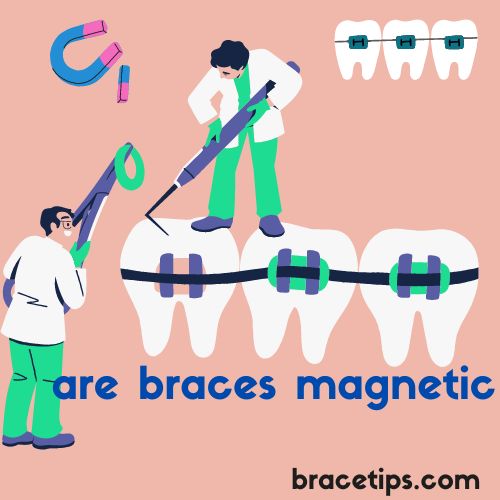Are Braces Magnetic
Orthodontic braces have been an instrumental tool in correcting dental alignment for decades. However, the intrigue around braces extends beyond their functional purpose. One of the recurring questions that surface is whether braces possess magnetic properties. The prospect of braces being magnetic holds implications not just in orthodontics but also in everyday scenarios involving magnets, metal detectors, and even medical procedures like MRI scans. Let’s delve into the intricacies of this topic to understand the truth behind the magnetism associated with braces. Among the various materials used in braces, metal components like brackets and wires are common. But have you ever wondered if these braces possess magnetic properties? The intriguing notion of braces being magnetic has sparked curiosity and raised questions about their interaction with magnets, metal detectors, and even medical imaging technology like MRIs.
Understanding the Magnetism of Braces
Do Braces Stick to Magnets?
The notion that braces possess magnetic qualities is partially true. While not all braces are magnetic, many orthodontic braces contain components that exhibit magnetic properties. The brackets and wires used in braces often comprise metals like stainless steel, nickel-titanium, or other alloys. These metals, particularly stainless steel, can be attracted to magnets.
Unveiling the Magnetic Attraction
Braces are indeed magnetic! The metal brackets and wires used in traditional braces typically contain materials such as stainless steel. Stainless steel comprises iron, chromium, nickel, and other elements, making it ferromagnetic. This property enables braces to exhibit magnetic characteristics, allowing them to attract and stick to magnets.
The magnetic nature of braces stems from the ferromagnetic elements present in the metallic components, primarily the iron content. When exposed to a magnet, the braces display a noticeable attraction, firmly sticking to the magnet’s surface due to their magnetic properties.
Magnets and Braces Interaction
It’s a common observation that magnets will stick to braces. This phenomenon occurs due to the presence of ferromagnetic materials in the braces’ construction. When exposed to a magnetic field, these materials generate a magnetic force, causing the braces to attract and hold onto magnets. This comprehensive exploration sheds light on the magnetic charm of braces, unveiling their interactions with external forces and the transformative potential of magnetic-based orthodontics.
Metal Detectors and Braces
The presence of metal in braces raises concerns about interactions with metal detectors, especially in places like airports or high-security areas. Indeed, the metal brackets and wires in braces can trigger metal detectors, leading to security checks and further scrutiny. The metal brackets and wires in braces can indeed set off metal detectors. However, this occurrence is a common and expected interaction. Informing security personnel about the presence of braces helps in expediting the screening process without causing any inconvenience.
The Emergence of Innovative Magnetic Orthodontic Systems
A New Orthodontic Force System of Magnetic Brackets
Innovation continues to reshape orthodontic practices, leading to the development of new systems incorporating magnetic brackets. These magnetic-based orthodontic systems aim to revolutionize tooth alignment by harnessing the power of magnets to apply precise and controlled forces.
The concept of magnetic brackets involves using strategically designed magnets within the braces to exert gentle forces on the teeth, facilitating their movement. This innovative approach offers potential advantages in terms of treatment efficiency and patient comfort, marking a paradigm shift in traditional orthodontic methodologies.
Exploring the Possibility of Magnetic Braces
Recent advancements in orthodontics have explored the integration of magnetics technology in brace. Innovations like magnetics brackets have been developed, aiming to introduce a new force system for tooth alignment. These magnetic brackets use the principles of magnetism to apply gentle pressure to move teeth, potentially offering a different approach to traditional orthodontic treatments. Researchers and orthodontists are exploring the feasibility of utilizing magnetics forces in brace to aid tooth alignment. This exploration involves developing magnetic brackets and systems that harness magnetic fields to apply controlled forces, potentially offering a more efficient and comfortable orthodontic treatment experience.
Can You Get an MRI with Braces?
One of the significant considerations for individuals with brace is their compatibility with medical procedures like Magnetic Resonance Imaging (MRI). The presence of metal in braces raises concerns about safety and interference during an MRI. However, most modern braces, while containing metal, are typically MRI-safe, allowing individuals with braces to undergo these diagnostic procedures. One common concern among individuals with braces is whether they can safely undergo magnetic resonance imaging (MRI) scans. The presence of metal in braces raises apprehensions about potential interactions with the strong magnetic fields used in MRI machines.
FAQ
Q:Are braces magnetic?
A:Yes, braces contain metal components like brackets and wires, usually made of stainless steel, exhibiting magnetic properties due to the presence of ferromagnetic elements.
Q:Do all braces have magnetic properties?
A: Not all brace exhibit magnetics properties. While many traditional brace contain metals that are attracted to magnets, newer materials and designs may not possess magnetics qualities.
Q:Do metal bracket braces set off metal detectors?
A:Yes, the metal brackets and wires in braces can trigger metal detectors, but informing security personnel about the braces helps in expediting the screening process.
Q:Can braces interfere with metal detectors?
A:Yes, the metal brackets and wires in braces can trigger metal detectors, leading to additional screening at security checkpoints.
Q:Are magnetic braces a new orthodontic advancement?
A:Yes, magnetic brace represent a recent innovation in orthodontics, utilizing magnetics technology to potentially revolutionize tooth alignment methods.
Q:Are braces MRI-safe?
A:Most modern braces are designed to be MRI-safe, allowing individuals with braces to undergo MRI scans without significant concerns regarding interference or safety.
Q:What is the significance of magnetic orthodontic systems?
A:Magnetic-based orthodontic systems utilize innovative magnetic brackets to apply controlled forces, potentially offering more efficient and comfortable tooth alignment treatments.
Conclusion
In the realm of orthodontics, the magnetism associated with braces has intrigued both professionals and patients alike. While braces containing certain metals can exhibit magnetics properties, the implications stretch beyond mere attraction to magnets. The evolution of orthodontic technology, including the development of magnetic brace, hints at a promising future in the field. Understanding the interplay between braces, magnets, metal detectors, and medical procedures is crucial for individuals undergoing orthodontic treatment. As advancements continue, the fascinating relationship between braces and magnetism continues to captivate our curiosity.

